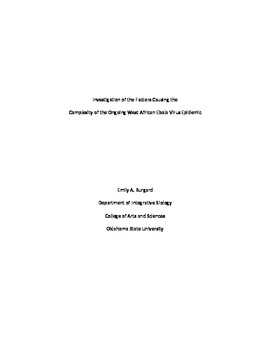| dc.description.abstract | Ebola virus disease is a hemorrhagic fever characterized by flu-like symptoms, internal and external bleeding, and quick onset of death in many victims. It was first identified in simultaneous outbreaks in Sudan and Zaire in 1976, and since then it has caused numerous small outbreaks and a few large ones. The largest outbreak to ever occur is still ongoing, with over 26,000 cases and over 11,000 deaths observed in the West African countries of Guinea, Liberia, and Sierra Leone. No previous outbreak has ever been so large, prompting many to question what exactly has caused this outbreak to become so large and complex. Because it is currently assumed that genetic changes in the strain causing this outbreak are not the cause of the size of the outbreak, the public health responses to each outbreak, cultural differences in each location, and the characteristics of the physical location of each outbreak were researched in order to determine if any difference in one of these variables could be behind the complexity of the current outbreak. Evidence indicates that poor public health infrastructure and spending, an inadequate initial international response, a lack of familiarity with Ebola in West Africa, and the proximity of the initial outbreak location to multiple capital cities allowed the virus to spread to and throughout numerous large cities while going undetected for almost three months, causing the outbreak to explode before officials had the chance to control it. | |
